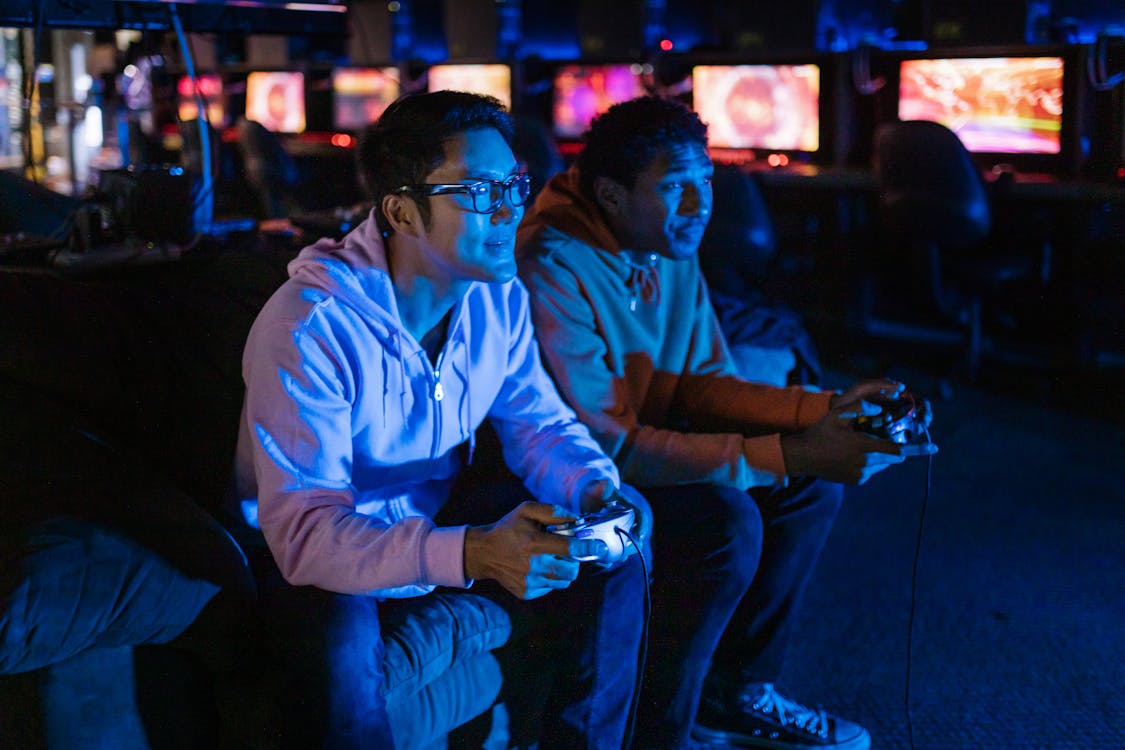Level Up Your Mind: Enhancing Problem-Solving Skills Through Games
Ever found yourself completely stumped by a real-life challenge, wishing you had a cheat code or a walkthrough? While life doesn’t offer those (unfortunately!), there’s a surprisingly fun and effective way to sharpen the very skills needed to navigate complex situations: playing games. Yes, you read that right! Far from being just a mindless pastime, games – from intricate strategy epics and mind-bending puzzles to immersive role-playing adventures – can be powerful tools for enhancing problem-solving skills.
Think about it. What do games constantly ask us to do? Analyze situations, devise strategies, adapt to changing circumstances, learn from failures, and ultimately, find solutions to overcome obstacles. Sound familiar? These are the cornerstones of effective problem-solving in *any* context, whether it’s tackling a tricky project at work, navigating a personal dilemma, or even figuring out how to assemble that notorious piece of flat-pack furniture. Let’s dive into how unlocking achievements in a virtual world can translate into real-world competence.

Why Games Are Such Effective Problem-Solving Trainers
What makes games uniquely suited for developing these crucial cognitive abilities? It’s not just about the challenges they present, but *how* they present them.
Motivation and Engagement
Let’s be honest: traditional learning methods or deliberate practice can sometimes feel like a chore. Games, by their very nature, are designed to be engaging. They tap into our intrinsic motivation through rewards, compelling narratives, satisfying feedback loops, and a sense of accomplishment. When you’re having fun, you’re more likely to persist through difficulty, investing hours into mastering systems and overcoming challenges – essentially, practicing problem-solving without even realizing it.
Safe Space for Failure
Real life often penalizes mistakes heavily. In a game, failure is usually just a temporary setback. Lost a match? Hit a game over screen? You can simply restart, try a different approach, and learn from what went wrong. This low-stakes environment encourages experimentation and risk-taking, crucial components of creative problem-solving. You’re free to test unconventional strategies without fear of real-world consequences, fostering resilience and an understanding that failure is part of the learning process.
Immediate Feedback
Games provide instant feedback on your actions. Did your strategy work? The game will immediately show you the results. This constant feedback loop allows for rapid iteration and learning. You quickly understand the cause-and-effect relationships within the game’s systems, helping you refine your approaches and make better decisions next time. This is far more effective than waiting days or weeks for feedback on a real-world project.
Diverse and Complex Challenges
Games offer an incredible variety of problems to solve. One moment you might be managing resources under pressure, the next deciphering a complex puzzle, and later coordinating tactics with a team. This diversity exposes you to different types of thinking and requires you to adapt your problem-solving toolkit constantly. Many modern games feature incredibly complex, interconnected systems that mirror real-world complexity, demanding sophisticated analytical and strategic thinking.
Game Genres That Boost Your Brainpower
While almost any game involves some level of problem-solving, certain genres are particularly adept at honing specific cognitive skills.
Puzzle Games: The Logic Builders
This is perhaps the most obvious category. Games like Portal (spatial reasoning, physics manipulation), The Witness (observational logic, pattern recognition), Sudoku, or even mobile hits like Candy Crush (at higher levels, requiring strategic planning) directly challenge your logical and analytical abilities. They often require you to:
- Identify patterns and rules.
- Break down complex problems into smaller steps.
- Think sequentially and anticipate consequences.
- Employ trial-and-error in a structured way.
- Develop spatial reasoning and visualization skills.
Puzzle games are fantastic for sharpening your ability to approach problems methodically and find elegant solutions.

Strategy Games: The Master Planners
Whether real-time (like StarCraft) or turn-based (like Civilization, XCOM, or classic Chess), strategy games are intense problem-solving engines. They demand:
- Long-term planning: Setting goals and devising multi-step plans to achieve them.
- Resource management: Allocating limited resources effectively.
- Adaptability: Responding to opponent actions and unexpected events.
- Risk assessment: Weighing potential outcomes before making a move.
- Systems thinking: Understanding how different elements interact within a complex system.
Playing strategy games trains you to think ahead, manage complexity, and make calculated decisions under pressure – invaluable skills for leadership and project management.
Role-Playing Games (RPGs): The Decision Navigators
RPGs like The Witcher 3, Mass Effect, or tabletop games like Dungeons & Dragons immerse you in rich worlds where your choices have consequences. They excel at developing:
- Decision-making skills: Evaluating options with often ambiguous information and long-term effects.
- Consequence management: Understanding how choices impact the narrative, characters, and game world.
- System mastery: Learning intricate character progression, combat, and dialogue systems.
- Perspective-taking: Understanding motivations and viewpoints of different characters (often required for dialogue puzzles or quest solutions).
- Creative problem-solving: Finding unique ways to overcome obstacles using character abilities and items.
RPGs teach you to think critically about choices, manage complex information, and see problems from multiple angles.
Simulation Games: The Systems Optimizers
Games like SimCity, Kerbal Space Program, or Factorio challenge you to build, manage, and optimize complex systems. They foster:
- Systems thinking: Deeply understanding how interconnected parts influence the whole.
- Optimization: Finding the most efficient ways to achieve goals within constraints.
- Trial-and-error learning: Experimenting with different designs and approaches.
- Planning and foresight: Anticipating future needs and potential bottlenecks.
- Attention to detail: Managing numerous variables simultaneously.
Simulations are excellent for developing analytical skills and an intuitive grasp of complex, dynamic systems, relevant to fields like engineering, economics, and urban planning.
Adventure/Exploration Games: The Environmental Detectives
Titles like The Legend of Zelda: Breath of the Wild or classic point-and-click adventures like Myst often rely on environmental storytelling and exploration-based puzzles. They enhance:
- Observation skills: Noticing subtle clues in the environment.
- Deductive reasoning: Piecing together information to solve mysteries or overcome obstacles.
- Spatial awareness: Navigating complex layouts and understanding environmental interactions.
- Resourcefulness: Using available tools and items in creative ways.
- Patience and persistence: Methodically exploring and experimenting.
These games train you to be more observant, think laterally, and approach problems by carefully analyzing your surroundings.
Serious Games & Educational Games
It’s also worth mentioning the growing field of “serious games.” These are designed explicitly with learning objectives in mind, often used in corporate training, healthcare, and education. They leverage game mechanics to teach specific skills or knowledge, including complex problem-solving scenarios relevant to particular professions.
Mapping Game Mechanics to Problem-Solving Skills
Let’s break down *how* specific actions within games translate into broader cognitive skills:

Analytical Thinking: Deconstructing the Challenge
Many games require you to analyze a situation before acting. A strategy game presents a complex battlefield; a puzzle game shows an intricate mechanism. You learn to break down the larger problem (win the battle, solve the puzzle) into smaller, manageable parts: identify threats, understand resource flow, recognize patterns, isolate variables. This mirrors how you’d analyze a complex business problem or a scientific challenge.
Critical Thinking: Evaluating Options and Information
Games constantly force you to evaluate information and choose the best course of action. Is this piece of loot worth the inventory space? Is this dialogue option likely to anger the NPC? Is attacking now better than defending? You learn to weigh pros and cons, assess risk versus reward, question assumptions (is that treasure chest *really* unguarded?), and filter relevant information from noise – the essence of critical thinking.
Creativity & Innovation: Finding Novel Solutions
While some games have linear solutions, many reward thinking outside the box. Sandbox games like Minecraft are built on creativity. Strategy games often see players developing unconventional tactics (‘cheese strategies’). Even puzzle games can have multiple solutions or require clever use of mechanics. This encourages looking beyond the obvious and experimenting with novel approaches, fostering creative problem-solving.
Decision Making: Committing Under Pressure
Real-time strategy games, action RPGs, and competitive multiplayer games demand quick decisions under pressure. Hesitation can mean defeat. You learn to rapidly assess situations, process available information, and commit to a course of action, even with incomplete data. This builds confidence in your decision-making skills and your ability to perform under stress.
Adaptability & Flexibility: Changing Tack When Needed
Game AI or human opponents rarely behave exactly as predicted. A carefully laid plan in a strategy game might be disrupted by an unexpected attack. A puzzle might not yield to your initial approach. Games teach you to be flexible, pivot your strategy, and adapt to changing circumstances. This adaptability is crucial in a rapidly changing world.
Persistence & Resilience: Overcoming Failure
How many times have you failed a difficult boss fight or puzzle? Games teach you to persevere. You analyze why you failed, adjust your strategy, and try again… and again. This builds resilience, grit, and the understanding that failure isn’t the end, but rather a stepping stone towards success. This mindset is invaluable when facing setbacks in real life.
Collaboration & Communication: Team-Based Problem Solving
Multiplayer games, especially cooperative ones (like MMORPG raids, games like Overcooked, or team-based shooters), require effective communication, coordination, and shared problem-solving. Players need to strategize together, communicate roles and intentions clearly, and support each other to overcome challenges. This directly translates to teamwork skills essential in the workplace and beyond.
Making Game-Based Skill Development Intentional
While simply playing games can passively enhance these skills, you can amplify the benefits by being more intentional.

Play with Purpose
Before diving into a game, think about what skills you want to practice. If you want to improve strategic thinking, pick up a turn-based strategy game. For spatial reasoning, try a physics puzzler. Knowing your goal helps you focus on the relevant aspects of gameplay.
Reflect on Your Gameplay
After a play session, especially after overcoming a tough challenge or failing repeatedly, take a moment to reflect:
- What was the core problem?
- What strategies did I try?
- Why did certain approaches fail?
- What eventually worked, and why?
- Could I have solved it more efficiently?
This metacognition – thinking about your thinking – is key to transferring learned skills.
Embrace Variety
Don’t just stick to one genre. Playing different types of games exposes you to different kinds of problems and forces you to use different cognitive muscles. Mix up strategy with puzzles, RPGs with simulations.
Balance Fun and Focus
Remember, games should still be enjoyable! Don’t turn play into a relentless grind for self-improvement. Find games you genuinely like, and the learning will often happen naturally. If you feel burnt out, take a break or switch to a different type of game.
Connect to Real Life
Actively try to draw parallels between game challenges and real-world problems. When facing a difficult task at work, ask yourself: “How would I approach this if it were a level in a game? What are the ‘rules’? What are my ‘resources’? What’s the ‘win condition’?” This conscious transfer helps solidify the skills.
Addressing the Skeptics: Concerns and Considerations
Of course, advocating for gaming as a tool for skill development isn’t without caveats.
- Screen Time: Excessive gaming can lead to sedentary behavior and eye strain. Moderation is key. Balance game time with physical activity and other hobbies.
- Addiction: Game design can be compelling, and some individuals may develop unhealthy gaming habits. Be mindful of your playtime and seek help if it negatively impacts other areas of your life.
- Game Choice Matters: Not all games are created equal in terms of skill development. While almost any game offers some cognitive benefit, complex puzzle, strategy, and simulation games are generally more potent problem-solving trainers than, say, simple reflex-based games or games heavily reliant on luck.
- Correlation vs. Causation: While studies show correlations between playing certain games and strong problem-solving skills, it’s complex. Do games *build* these skills, or do people with these skills gravitate towards certain games? Research suggests it’s likely a bit of both, with gameplay actively contributing to skill enhancement.
Practical Tips to Get Started
Ready to leverage games for cognitive enhancement? Here’s how:
- Identify Your Weak Spots: Are you struggling with planning, creativity, or decision-making? Choose game genres that target those specific areas.
- Do Some Research: Look for highly-rated games in your chosen genre. Read reviews (sites like Metacritic, IGN, or specific genre forums can be helpful) focusing on gameplay mechanics and depth.
- Start Small & Accessible: You don’t need a high-end PC. Many excellent puzzle and strategy games are available on mobile devices, consoles, or older computers. Many classics are inexpensive or even free.
- Join Communities: Online forums, Discord servers, or subreddits dedicated to specific games are great places to discuss strategies, learn from others, and deepen your understanding of the game’s systems.
- Don’t Be Afraid to Adjust Difficulty: If a game is too easy, you won’t be challenged. If it’s frustratingly hard, you might give up. Find a difficulty level that pushes you slightly outside your comfort zone.
- Play with Others: Engage in cooperative or competitive multiplayer to practice teamwork, communication, and adapting to human opponents.
Conclusion: Play Your Way to Better Problem-Solving
The idea that playing games can make you a better thinker isn’t just wishful thinking; it’s backed by the very design of games themselves. They present us with engaging, complex problems in environments where we’re motivated to learn, experiment, and persevere through failure. From the meticulous planning required in strategy games to the logical deduction needed for puzzles, and the critical decision-making central to RPGs, games offer a rich playground for developing and honing essential problem-solving skills.
By approaching gaming with a degree of intentionality – choosing games thoughtfully, reflecting on gameplay, and consciously connecting in-game strategies to real-world challenges – you can transform your leisure time into a powerful engine for cognitive growth. So, the next time you feel stuck on a difficult problem, maybe the answer isn’t to buckle down harder, but to boot up your favorite game. You might just find that leveling up your character also means leveling up your mind. Go ahead, press start on your journey to becoming a better problem solver!










